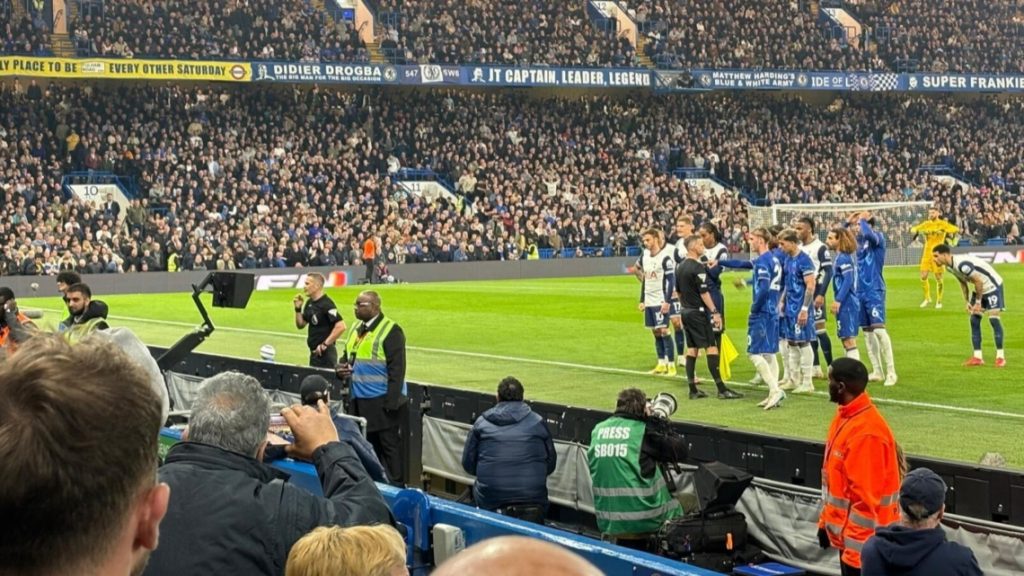Stamford Bridge played host to a tense and dramatic Premier League London derby on Thursday night, where Chelsea edged out Tottenham Hotspur 1-0 in a match overshadowed by lengthy and controversial Video Assistant Referee (VAR) interventions. The game, crucial for Chelsea’s Champions League aspirations, saw two goals disallowed after extensive reviews, sparking frustration among players, managers, and fans alike.
The sole goal of the match came early in the second half when Enzo Fernandez rose unmarked to head in a pinpoint cross from Cole Palmer in the 50th minute. The victory propelled Chelsea back into the Premier League’s top four, bolstering their hopes of securing a Champions League spot with only eight games remaining in the season. However, the post-match conversation was dominated not by the result, but by the VAR decisions that shaped the game’s narrative.
The first major VAR moment arrived shortly after Fernandez’s goal, in the 56th minute, when Chelsea’s Moises Caicedo appeared to double the Blues’ lead with a stunning volley. Stamford Bridge erupted, but the celebrations were cut short after a four-minute review determined that an offside call nullified the strike. The Premier League later released a statement clarifying the decision, though it did little to quell the discontent among Chelsea supporters who felt robbed of a potentially game-sealing moment.
Tottenham, desperate to salvage a point in their faltering season, thought they had equalized in the 72nd minute when substitute Pape Matar Sarr unleashed a ferocious long-range strike past Chelsea goalkeeper Robert Sanchez. Spurs boss Ange Postecoglou, under increasing pressure after a 16th league defeat this campaign, cupped his ears to the traveling Tottenham fans in a gesture of defiance—only for VAR to intervene once more. After a six-minute review, referee Craig Pawson was sent to the pitchside monitor and overturned the goal, ruling that Sarr had fouled Caicedo in the build-up. Sarr was shown a yellow card for the challenge, though some argued it warranted a red.
Chelsea head coach Enzo Maresca praised his side’s resilience, admitting the prolonged stoppage time—12 minutes added due to the VAR checks—nearly cost them. “We created enough chances in the first half, and then to be honest, I made a mistake with the substitutions,” Maresca said, referencing his late defensive changes that invited pressure from Spurs. “But the team showed character to hang on. It was an ugly win, but an important one.”
Postecoglou, meanwhile, was scathing in his assessment of VAR’s impact. “It’s killing the game, killing the spectacle,” he fumed post-match. “Six minutes to make a decision—it’s ridiculous. We’re going to be refereed by AI pretty soon if this continues.” The Tottenham manager also addressed his ear-cupping gesture, denying it was meant to taunt his own fans. “I just wanted to hear them cheer,” he insisted, though the disallowed goal left him with little to celebrate.
The match itself was a pulsating affair, with Chelsea dominating the first half but failing to convert several gilt-edged chances. Jadon Sancho and Nicolas Jackson both tested Tottenham goalkeeper Guglielmo Vicario, who kept his side in the contest with a string of fine saves. Tottenham, struggling for form and sitting 14th in the table, carried a threat on the counter but managed just one clear chance—a late sliding effort from Heung-min Son, brilliantly denied by Sanchez.
The VAR controversies added to an already fiery encounter, with referee Pawson issuing ten yellow cards in total as tempers flared. Chelsea’s Marc Cucurella and Tottenham’s Pedro Porro were among those booked, reflecting the physicality and stakes of the derby.

